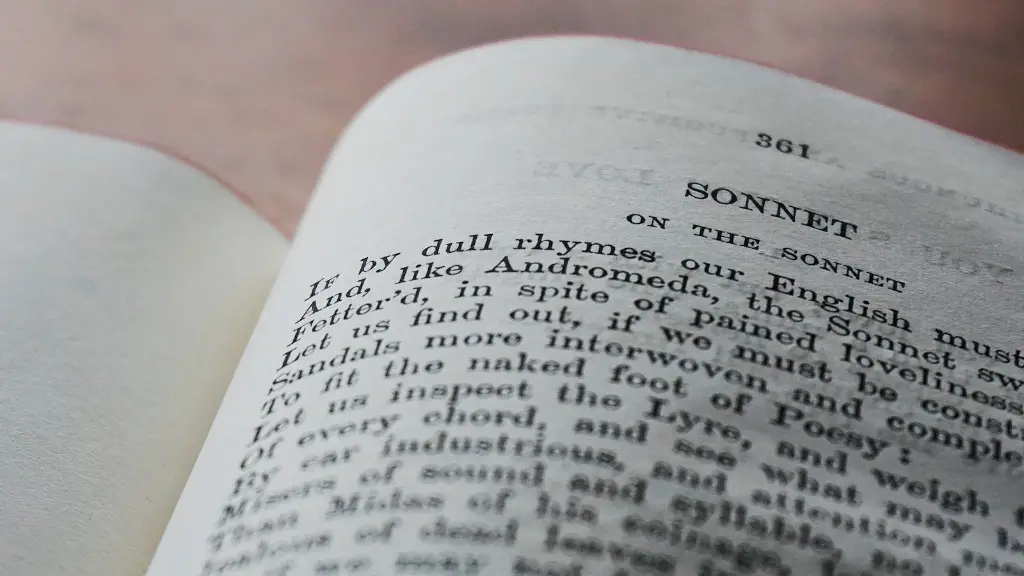Robert Frost was a prolific American poet who is highly regarded for his profundity and genuine appreciation for the simple joys of nature. One of the major topics that Frost explored and illuminated throughout his works was nature and its effects on the human experience. Frost’s writing was informed and informed by his deep relationship with the natural landscape. He wrote with a unique reverence and understanding that comes from one who has experienced and explored the wilderness and all its rugged beauty. As a result of this, his writing has the power to evoke emotions and to stir the soul because it contains a wealth of descriptive details that are intimately familiar to the reader. In particular, he often focused on his love of the forest and rural landscapes, referring to the beauty of their environment and the way in which their lifescapes could bring solace and peace to the anxious heart. His writing was also marked by his lyrical and evocative writing style, as well as his knack for understanding that nature has the power to teach us so much about our own struggles and successes. Another important reason why Robert Frost wrote about nature was that his own life was so full of struggles and joy, which he often found solace in exploring nature. Natural settings gave him the perfect opportunity for introspection and reflection, and the emotional freedom that accompanies outdoor activities was the perfect outlet for his emotional reflections.
Influence of Nature on Mental Wellbeing
It’s likely that Robert Frost wrote about nature in order to connect personally with the complexities of nature and its complexity. A significant source of meaning could be derived from observing and reflecting on the physical world. Additionally, spending time outdoors can be hugely beneficial to mental wellbeing and can be an invaluable source of solace, peace and relaxation. For example, recent studies have suggested that nature can help reduce stress, promote creativity and most importantly provide an effective antidote to the everyday hustle and bustle of modern life. In short, Robert Frost’s writing on nature was likely informed by his own appreciation of the therapeutic value of being outdoors.
Nature as a Teacher
Another likely reason that Robert Frost wrote about nature was that he felt it had much to teach us. Nature can be a great teacher providing us with much-needed insight about our own lives and struggles. Frost wrote with a great appreciation for the complexity of nature, often drawing instinctive comparisons between its circles and cycles to our own lives and ideals. Nature can provide us with invaluable lessons, providing us with advice on how to lead our lives more effectively. For example, in one of his poems Frost deftly compared the complexities of modern life to that of nature, noting that – “Earth’s the right place for love: I don’t know where it’s likely to go better.” Furthermore, the beauty of nature has the potential to inspire us to make the most of our time, to live fully and embrace each moment. Because of this, it’s not surprising that Frost’s work was full of lyrical tales of nature’s wisdom and beauty.
The Allure of Nature for Writing
Perhaps the major draw for Frost when it came to writing about nature was its aesthetic quality. In his eyes, nature was simply gorgeous and provided a wealth of aesthetic inspiration. In Aurora Leigh, Frost wrote – “Nature’s delicious in her dainties should be smacked and not wept over.” He was captivated by nature’s beauty and believed that there was a kind of inexpressible beauty in its every detail. Additionally, there was something profoundly tranquilizing about nature and being surrounded by its beauty. For Frost, nature and its landscapes were something to be experienced with all of one’s senses, allowing a full appreciation of the world that surrounds us.
Nature as a Comfort
Given the fact that Frost often utilized nature as a source of inspiration for his work, it’s not surprising that he found solace in writing about natural landscapes. As mentioned, nature had the power to grant him a sense of peace and contentment, especially when he found himself in a difficult place. Writing poetry about nature was a form of escapism that allowed Frost to find refuge from his troubles and to recharge. Additionally, nature provided him with a great opportunity to express his appreciation for the wonders of the world. However, there was something more than just escapism at work; Frost wrote to find truths and garner companionship. By writing about nature, he felt connected to its immense energy, something that left him feeling valued and at peace.
Understanding Other Perspectives through Nature
Lastly, Frost wrote about nature in order to explore the complex interconnections between humanity, nature and the universe. He was fascinated by the idea of seeking knowledge from nature and was often found to be questioning the nature of all things. He was also aware, however, that one person’s experience with nature was often vastly different from another’s. Through his writing, he was able to draw attention to the various ways in which people responded to and interacted with the natural world, promoting understanding and acceptance of different perspectives.
Why Writing Aesthetics Matter
The importance of Frost’s writing style is especially evident when discussing his works related to nature. His writing is filled with lyrical detail and a precise economy of words that evoke a powerful image while remaining concise and concisely precise. His language is often precise, as if a photographer had captured the details of the images he is describing. Additionally, Frost often utilized a rhythmic and poetic diction to draw attention to the magic of nature and its power to bewitch us. Ultimately, this precise, lyrical writing was designed to celebrate and honor the beauty of nature.
Exploring Enduring Themes in Nature
Another dimension of Frost’s poetry that added to the beauty of his writing about nature was his exploration of deep, enduring themes. In writing about nature, Frost often looked beyond the immediate physical beauty of natural landscapes to explore more complex topics. He often explored themes of death, loss, loneliness and endurance, among other topics. In “Birches,” he paints a picture of a boy swinging on birch branches and in the process emphasizing his own experienced understanding of life and death. Similarly, in other works such as “The Road Not Taken,” Frost uses nature to discuss the importance of individual choice and the implications that choice has on our lives.
Perceiving Nature Differently
Finally, Frost wrote about nature in order to point out the ways in which it is so often overlooked. In his works, he presented a different perspective on the same landscape, hoping to remind us of what can be discovered if one is open to the possibility that nature provides. He often found nature to be an opportunity for growth and learning, challenging us to find new meanings and interpretations from the same places. In addition to exploring their spiritual qualities, Frost sought to highlight the fact that nature is intended to be experienced on its own terms, not seen through our limited perspective.
Highlighting Poetic qualities of Nature
In his works, Frost also emphasized the poetic quality of nature. He pointed out the singular beauty of natural phenomena, such as the language of birdsong or the nuances of a sunset. He subtlety used these moments to remind readers of the simple joys of life found in nature. Additionally, Frost wrote to demonstrate the power of nature as a tool for creativity. He was often enthralled by the power of nature’s architecture and its detail. He employed words to describe these landscapes in a poetic and evocative manner, drawing comparisons between the shapes of trees and streams, and creating stories of summer and winter scenes.
Deepening Appreciation for Nature
Robert Frost’s works about nature have encouraged readers to take the time to explore and appreciate the natural world. He encouraged his readers to observe the nuances and textures of the natural environment and to see the world through fresh eyes. His relationship with nature and the inspiration for his works has deeply influenced many poets and writers who have come after him, further deepening our appreciation for nature. By focusing on the beauty of nature and exploring its complexities, Frost has provided readers with an insight into their own lives and an understanding of why nature is so deeply important to us.


